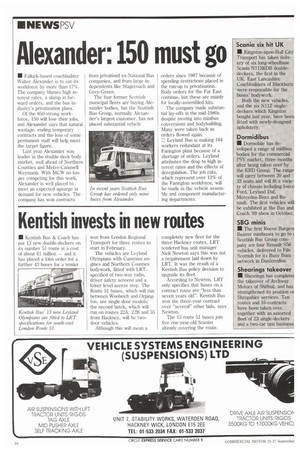Alexander: 150 must go
Page 22

If you've noticed an error in this article please click here to report it so we can fix it.
• Falkirk-based coachbuilder Walter Alexander is to cut its workforce by more than 17%. The company blames high interest rates, a slump in forward orders, and the bus industry's privatisation plans.
Of the 850-strong workforce, 150 will lose their jobs, and Alexander says that natural wastage, ending temporary contracts and the loss of some permanent staff will help meet the target figure.
Last year Alexander was leader in the double-deck body market, well ahead of Northern Counties and Metro-Cammell Weymann. With MCW no longer competing for this work, Alexander is well placed to meet an expected upsurge in demand for new vehicles. The company has won contracts from privatised ex-National Bus companies, and from large independents like Stagecoach and Grey-Green.
The four former Scottish municipal fleets are buying Alexander bodies, but the Scottish Bus Group, normally Alexander's largest customer, has not placed substantial vehicle orders since 1987 because of spending restrictions placed in the run-up to privatisation. Body orders for the Far East continue, but these are mainly for locally-assembled kits.
The company made substantial lay-offs in the mid-1980s despite moving into minibus conversions and bodybuilding. Many were taken back as orders flowed again.
E Leyland Bus is making 164 workers redundant at its Farington plant because of a shortage of orders. Leyland attributes the drop to high interest rates and the effects of deregulation. The job cuts, which represent over 12% of the Farington workforce, will be made in the vehicle assembly and component manufacturing departments.




























































































































































